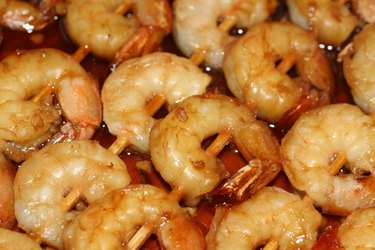Things You'll Need
Compost bucket
Compost pile
Shovel
Green yard waste
Brown yard waste
Kitchen scraps

Shrimp shells, like other shellfish, are useful in compost. The shells contain compounds that feed bacteria and fungi which, in turn, helps the soil to break down. When used in a potato patch, the compounds in shrimp shells can destroy hatching eggs of nematodes, which can damage the plants and destroy the crop. Shrimp shells can be composted either raw or cooked.
Step 1
Collect the shells from peeled shrimp in a compost bucket or a bowl with a tight fitting lid until you can take the shells outside. You can include the tails and heads also.
Video of the Day
Step 2
Dig a 12-inch hole in your existing compost pile. If your pile is not deep enough to do this, shovel a hole as deep as possible.
Step 3
Place the shrimp shells in the hole and cover with the removed compost.
Step 4
Continue to add both green and brown yard waste along with kitchen scraps to the pile, turning the pile every month.
Step 5
Allow the compost to season for at least one year before using it in your garden spaces.
Tip
When peeling raw shrimp, collect the shells and boil for 30 minutes covered with water. Strain the shells from the broth. This makes a good start to a seafood stock for soups and gravies.
Video of the Day